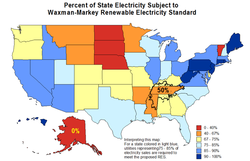POWER POLITICS: Climate bill provides big loopholes for Tennessee Valley Authority
 The House Energy and Commerce Committee approved landmark legislation last week that aims to reduce greenhouse gas pollution by creating a cap-and-trade system for emissions while promoting renewable energy. The bill is the American Clean Energy and Security Act, sponsored by Committee Chair Henry Waxman (D-Calif.) and Subcommittee Chair Edward Markey (D-Mass.).
The House Energy and Commerce Committee approved landmark legislation last week that aims to reduce greenhouse gas pollution by creating a cap-and-trade system for emissions while promoting renewable energy. The bill is the American Clean Energy and Security Act, sponsored by Committee Chair Henry Waxman (D-Calif.) and Subcommittee Chair Edward Markey (D-Mass.)."This bill, when enacted into law this year, will break our dependence on foreign oil, make our nation the world leader in clean energy jobs and technology, and cut global warming pollution," Waxman said.
The measure was fought by Big Oil, which argued that it would lead to massive job losses. Many environmental groups see its advance as a victory for the climate, though others are critical of its lowered emission targets and giveaways to the dirty energy lobbies.
In a discussion last week on the Democracy Now! radio show, Dan Lashof of the Natural Resources Defense Council praised the bill's passage as "a historic breakthrough" that will mobilize investments in clean energy and reduce the pollution that causes global warming. But taking a more skeptical view of the bill was Public Citizen's Tyson Slocum, who said it would "not result in significant reductions" and "creates a legal right to pollute for industries and gives away credits for free to allow companies to meet those targets without having to pay for them."
Another critic of the bill is U.N. Secretary General Ban Ki-moon. Though he praises President Obama's engagement on global warming, Ban points out that the bill aims to cut U.S. greenhouse gas emissions by only 17% below 2005 levels by the year 2020. "That's clearly lower than other countries are now aiming, particularly the European Union," he told Reuters.
Closer to home, the Southern Alliance for Clean Energy is supporting the legislation. However, SACE Research Director John D. Wilson notes on the group's blog that there have been "some pretty remarkable changes to the bill language." Those changes come in the section of the bill that requires industries to generate a certain percentage of their energy from renewable sources (known as a "renewable energy standard," or RES) and to take steps toward greater energy efficiency.
The version of the bill passed by the committee includes an RES of 20% by 2020, and allows states to meet up to 8% of that through energy efficiency improvements -- less than half the targets originally proposed by President Obama and Markey. There were also changes made in the threshold for regulation under the standard, Wilson points out:
In fact, the provision is so expansive that although the Tennessee Valley Authority is arguably the largest utility system in the country, public or private, the bill would exempt 50% of the Tennessee Valley Authority system from the renewable electricity standard (RES).Just how big an exemption does the TVA get under the current version of the bill? Rather than having to meet the 12 to 15% renewable energy goal and the 5 to 8% energy efficiency goal, TVA would have to generate only 6 to 7.5% of its energy from renewable sources and meet an efficiency goal of just 2.5 to 4%, according to the SACE analysis. In addition, only the TVA itself and its six largest distribution utilities would be subject to the law, while 153 of the company's smaller distribution utilities would be exempt.
The revised RES includes a requirement that certain utilities provide 12-15% renewable energy and 5-8% energy efficiency by 2020. Utilities with annual electricity sales greater than 4 million megawatt hours (MWh) are required to meet this standard.
The TVA's large exemption drives the Southeast's generally above-average exemption. Southeast states with little or no TVA presence tend to have lower exemption rates than those with a large TVA presence. Looking at an eight-state region, utilities representing 26% of electricity sales in 2007 would be exempted from the RES, compared with an average national exemption of 20%.
Those exemptions could put the South at a disadvantage in the new energy economy. As the American Wind Energy Association notes, the bill's lowered renewable energy and efficiency standards "could severely blunt the signal to the private sector to invest billions of dollars and expand production, manufacturing, and job creation." Because of the changes made in the threshold for regulation, that signal would be even more blunted in the South.
You might think that a federally owned company like the TVA would be on the cutting edge of promoting renewable energy. But unfortunately, under the current version of the climate bill that's not the case.
(Map by the Southern Alliance for Clean Energy)
Tags
Sue Sturgis
Sue is the former editorial director of Facing South and the Institute for Southern Studies.
